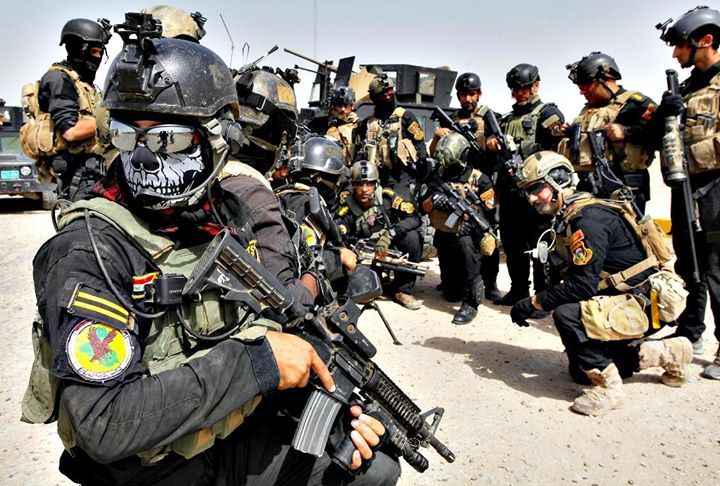After talks between Washington and Baghdad on resetting the relationship between the two countries, the Iraqis finally took action against Iranian proxy militias that have been launching mortar and rocket fire attacks at bases housing U.S. troops. Iraqi inaction had been a major thorn in the U.S.’s side for months.
As a result, the Iraqi Counter-Terrorism Service (CTS) conducted a raid against the Kataib Hezbollah headquarters in Baghdad, which was identified as Brigade 45 of the Hashed al-Shaabi military force. The raid ended in the arrest of more than a dozen fighters and the seizure of three rocket launchers.
The CTS had received intelligence about possible forthcoming attacks against the Green Zone, according to a Joint Operations Command statement issued immediately following the Kataib Hezbollah raid.
“The CTS was tasked to arrest [the militiamen] and prevent terrorist acts against state facilities. CTS carried out the task with high professionalism arresting 14 defendants, with the criminal evidence of two launching bases. Upon completion of the operation, a special investigations committee was formed by the Ministry of Interior that includes security services members. The defendants are kept in custody until the relevant court will address their case,” the statement read.
Now, Qais al-Khazali, head of Asaib Ahl al-Haqthe militia — which is part of the Iranian-backed Popular Mobilization Units (PMU) — is threatening the government of Prime Minister Mustafa al-Kadhimi, with a warning to not continue taking actions against militias that are targeting Americans. The threat was echoed by Asaib Ahl al-Haqthe’s political allies.
“Your government is a temporary government with two specific goals: early election… and addressing the economic and health challenges,” Khazali said. “Don’t create any other issues and don’t get involved in other issues that might happen. Otherwise, you might lose everything.” He then admitted what the militias have been denying for months, that they were indeed behind the attacks on the American troops.
“You want to resolve the attacks by the resistance factions against the U.S. forces, but you could never do that. None of the previous governments could do that and none of them took such an action. Instead, they were all ignoring this issue because they knew they couldn’t touch it,” Khazali added.
Since October, the Iranian-led militias have launched about three dozen attacks against American installations in Iraq, including several military bases, the U.S. Embassy in Baghdad, and U.S. oil companies. In late December, the U.S. retaliated by launching heavy airstrikes against the militias. Then, with the greenlight of Major General Qassem Soleimani, commander of Iran’s Quds Force, the militias attacked the U.S. Embassy. Several days later, the over-confident Soleimani arrived at an airport with the Deputy Commander of the PMUs. They were both killed in a drone missile strike.
Now, the Iranian proxies, which have ingrained themselves into the Iraqi security system, feel they have more power than the government and they are not afraid of pushing back. The raid against Kataib Hezbollah, which was the first of its kind, has triggered the confrontation between Kadhimi’s government and the Iranians.
Khazali wasted little time accusing Joint Operations Command of having its statement “written by American hands.” Kataib Hezbollah also spread disinformation that U.S. Ambassador to Kuwait, Alina Romanowski, had confirmed that the U.S.-led coalition had conducted the raid with CTS against Kataib Hezbollah at the request of the Iraqi government.
The U.S. Embassy in Baghdad immediately denied the news, saying, “The remarks attributed to U.S. Ambassador to Kuwait Alina Romanowski in the Iraqi media are a malicious fabrication. Ambassador Romanowski gave no such interview and the purported ‘news’ originates from a website created to spread fake information.”
Already have an account? Sign In
Two ways to continue to read this article.
Subscribe
$1.99
every 4 weeks
- Unlimited access to all articles
- Support independent journalism
- Ad-free reading experience
Subscribe Now
Recurring Monthly. Cancel Anytime.
Many Iraqis are now supporting Kadhimi, among them the Sunnis as well as the Kurds that want to bring stability back to Iraq and move away from an Iraq subservient to Iran.
Most of the PMU and other Iranian proxy militias will be a tough nut for the Iraqi government to crack. Al-Kadhimi and the U.S. may sit down soon and work out a longterm plan, yet, if foreign capital is to be drawn to the country, the Iraqi government has to be able to protect foreign diplomatic missions and companies. That runs counter to what Tehran wants in Iraq.
The Iraqi Counter-Terrorism Service (CTS) was set up by the United States Army Special Forces following the 2003 invasion that toppled Saddam Hussein. The Service has retained close ties to the U.S. Its current commander, Abdulwahab al-Saadi, was appointed last month by Prime Minister Kadhemi.










COMMENTS